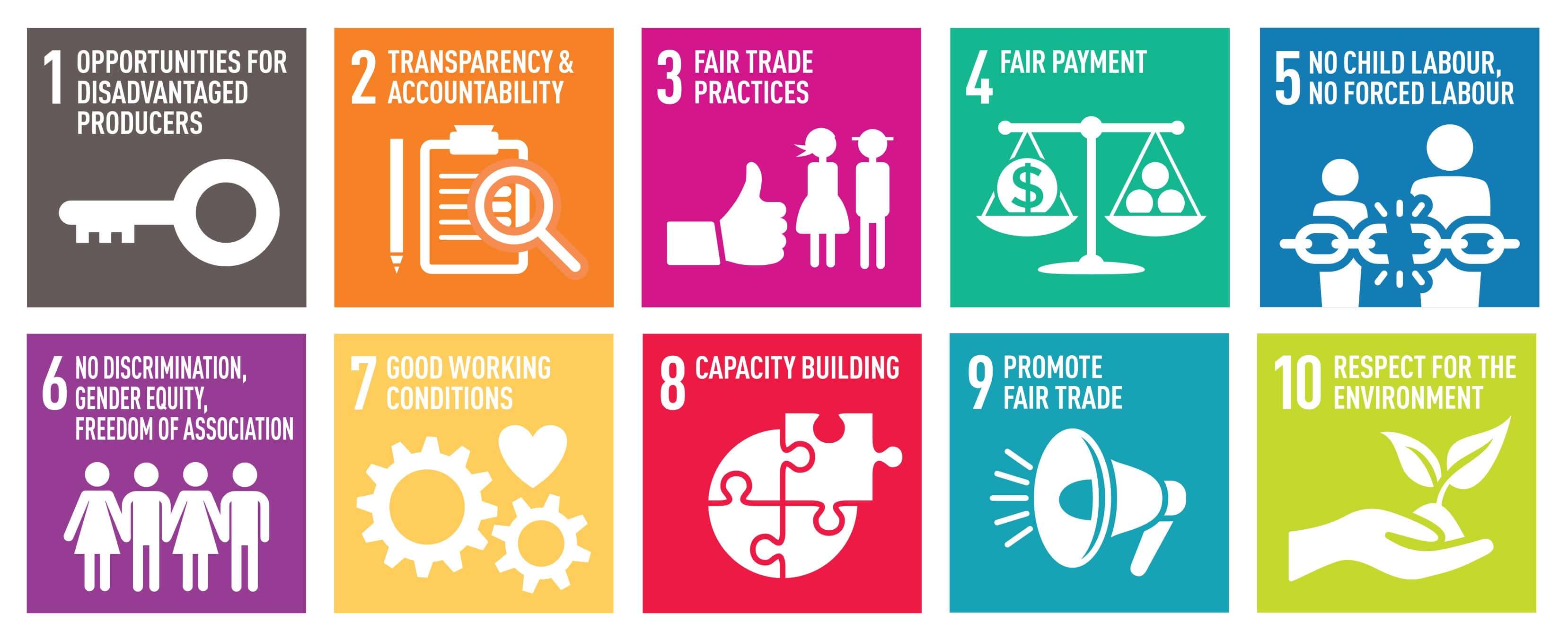The World Fair Trade Organisation or WFTO prescribes 10 Principles that Fair Trade Organizations must follow in their day-to-day work and carries out monitoring to ensure these principles are upheld:

Image Credit: World Fair Trade Organisation
Principle One: Creating Opportunities for Economically Disadvantaged Producers
Poverty reduction through trade forms a key part of the organization's aims. The organization supports marginalized small producers, whether these are independent family businesses, or grouped in associations or co-operatives. It seeks to enable them to move from income insecurity and poverty to economic self-sufficiency and ownership. The organization has to have a plan of action to carry this out.
Principle Two: Transparency and Accountability
The organisation is transparent in its management and commercial relations. It is accountable to all its stakeholders and respects the sensitivity and confidentiality of commercial information supplied.
Principle Three: Fair Trading Practices
The organisation trades with concern for the social, economic and environmental well-being of marginalised small producers and does not maximise profit at their expense. It is responsible and professional in meeting its commitments in a timely manner.
The organization maintains long term relationships based on solidarity, trust and mutual respect that contribute to the promotion and growth of Fair Trade. It maintains effective communication with its trading partners. The organization works cooperatively with the other Fair Trade Organizations in country and avoids unfair competition.
Fair Trade recognizes, promotes and protects the cultural identity and traditional skills of small producers as reflected in their craft designs, food products and other related services.
Principle Four: Payment of a Fair Price
A fair price is one that has been mutually agreed by all through dialogue and participation, which provides fair pay to the producers and can also be sustained by the market. Where Fair trade pricing structures exist, these are used as a minimum. Fair pay means a socially acceptable amount of money paid for workers considered by producers themselves to be fair and which takes into account the principle of equal pay for equal work by women and men.
Principle Five: Ensuring No Child Labour and Forced Labour
The organisation adheres to the UN Convention on the Rights of the Child, and national and local law on the employment of children. The organisation ensures that there is no forced labour in its workforce and/or members or home workers.
Any involvement of children in the production of Fair Trade products (including learning a traditional art or craft) is always disclosed and monitored and does not adversely affect the children's well-being, security, educational requirements and need for play.
Principle Six: Commitment to Non Discrimination, Gender Equity and Freedom of Association
The organisation does not discriminate in hiring, remuneration, access to training, promotion, termination or retirement based on race, caste, national origin, religion, disability, gender, sexual orientation, union membership, political affiliation, HIV/Aids status or age.
Principle Seven: Ensuring Good Working Conditions
The organization provides a safe and healthy working environment for employees and / or members. It complies, at a minimum, with national and local laws on health and safety. Fair Trade Organizations are aware of the health and safety conditions in the producer groups they buy from.
Principle Eight: Providing Capacity Building
The organisation seeks to increase positive developmental impacts for small, marginalized producers through Fair Trade.
The business develops the skills and capabilities of its own employees or members. Organizations working directly with small producers develop specific activities to help these producers improve skills they need.
Principle Nine: Promoting Fair Trade
The organisation raises awareness of the aim of Fair Trade and of the need for greater justice in world trade through Fair Trade. It advocates for the objectives and activities of Fair Trade according to the scope of the organization. The organization provides its customers with information about itself, the products it markets, and the producer organizations or members that make or harvest the products. Honest advertising and marketing techniques are always used.
Principle Ten: Respect for the Environment
Organisations which produce Fair Trade products maximize the use of raw materials from sustainably managed sources in their ranges, buying locally when possible.
Buyers and importers of Fair Trade products give priority to buying products made from raw materials that originate from sustainably managed sources, and have the least overall impact on the environment.
Businesses, organisations, self-employed has to use recycled or easily biodegradable materials for packing to the extent possible, and goods are dispatched by sea wherever possible.
Voyage Fair Trade strongly believe these above principles are fundamental to all businesses and societies and the products sold on our online shop are all choosen around these principles. However, you can see a list of the fair trade organisations we work with who have been accredited by the WFTO.













